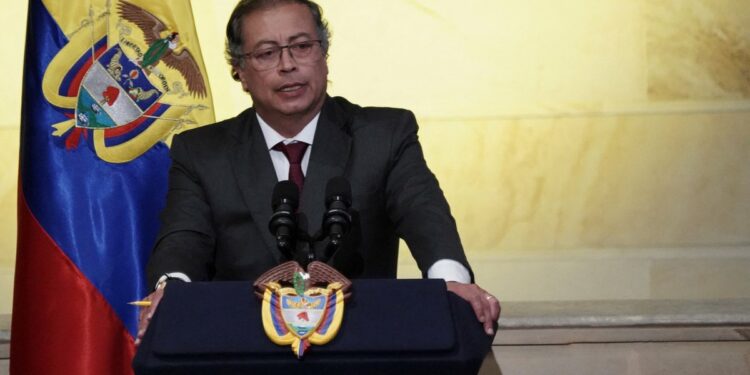Petro leaves Colombia ill-equipped to handle a new Venezuelan migration wave. Colombia successfully managed the arrival of one million Venezuelans between 2017 and 2018—the biggest inflow of migrants in its history—by granting work permits and temporary protection status. By August 2023, over two million Venezuelans had gained legal status through the Estatuto Temporal de ProtecciĂłn para Migrantes Venezolanos (ETPV), a program allowing them to live, work, and access social services in Colombia for ten years. The ETPV sets migrants up to apply for permanent legal residency after a period of ten years, opening a pathway for many of the three million Venezuelans living in Colombia today (almost 40 percent of the diaspora globally) to stay permanently.Â
But President Gustavo Petro has eroded Colombia’s institutions for managing migration since taking office in 2022, leaving the country ill-equipped to handle a new migration wave likely to come as Venezuelan President Nicolás Maduro doubles down on repression to stay in power. Petro eliminated the agency in charge of coordinating migration management nationally and locally, and let the ETPV program lapse (because the Petro government did not extend the last deadline to apply, no one has been able to file a new application since November 2023). Without leadership from Bogotá, local governments have had to pick up the slack, but they lack resources. The added strain is turning Colombians and local elected officials against migration, despite its boost to Colombia’s economy. In 2023 local elections, mayoral candidates in Bogotá and Bucaramanga blamed rising insecurity on Venezuelan migrants, despite a lack of evidence. Colombia could still manage another migration wave by renewing the ETPV program and giving local governments more resources. Petro should change course now or soon he will face a crisis.
More on:
Colombia
El Salvador
Venezuela
Immigration and Migration
Defense and Security
Bukele’s Mano Dura Tactics Got Results on Crime, But Won’t Fix the Economy. Since declaring a state of exception and suspending civil liberties in March 2022, the government of Salvadoran President Nayib Bukele has jailed over 105,000 alleged gang members—almost 2 percent of the total population. The mano dura (tough-on-crime) strategy has brought murders and extortions to new lows according to government figures, at the cost of widespread human rights violations including mass trials, arbitrary detentions, forced disappearances, and torture.Â
Latin America’s Moment
Latin America’s Moment analyzes economic, political, and social issues and trends throughout the Western Hemisphere. 1-3 times weekly.
Latin America’s Moment analyzes economic, political, and social issues and trends throughout the Western Hemisphere. 1-3 times weekly.
By entering your email and clicking subscribe, you’re agreeing to receive announcements from CFR about our products and services, as well as invitations to CFR events. You are also agreeing to our Privacy Policy and Terms of Use.
Bukele now aims to apply the mano dura approach to revive El Salvador’s struggling economy. Under his watch, the country’s debt rose to over 84 percent of GDP, jeopardizing a potential $1.3 billion loan from the International Monetary Fund. Nearly half of the population lacks consistent access to food, some going without food for a day or more, amid stagnant wages and skyrocketing basic food costs. Bukele blames the country’s wholesalers and retailers, who he says evade taxes, bribe officials, and import contraband.Â
On July 7, he threatened them with jail time if they refuse to abide by the law—a thinly veiled demand to lower prices. Bukele also revealed plans to eliminate tariffs on fertilizers, compost, animal feed, and over one hundred basic food products, and to set up thirty farmers markets where citizens can purchase goods at lower prices, effectively cutting out distributor middlemen.Â
But the challenge is less local price gouging than rising global import costs. Without a national agricultural policy to boost domestic food production, El Salvador relies on imports for some 80 percent of its food. Controlling local prices helps those who have less to spend but will likely lead to widespread shortages, as wholesalers and retailers bow out. The failure of local price controls to combat inflation long term is well-documented across the region: Venezuela and Argentina’s attempts at similar controls led to black markets and economic chaos. Jailing people for not reducing prices could lead to decreased supply overall, making items scarcer and driving up prices even further.
More on:
Colombia
El Salvador
Venezuela
Immigration and Migration
Defense and Security
Source link : http://www.bing.com/news/apiclick.aspx?ref=FexRss&aid=&tid=66b3c323e6ed4b17895b12693ca4f016&url=https%3A%2F%2Fwww.cfr.org%2Fblog%2Fcolombia-isnt-ready-new-venezuelan-migration-wave-plus-bukeles-mano-dura-threats-wont-fix&c=3137824788820629883&mkt=en-us
Author :
Publish date : 2024-08-07 03:38:00
Copyright for syndicated content belongs to the linked Source.












